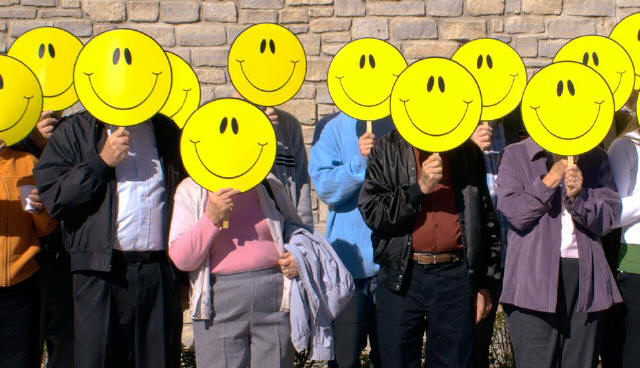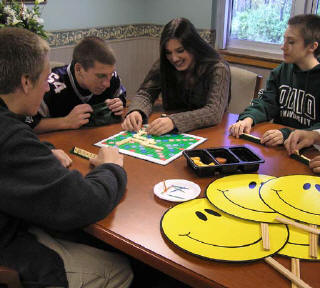Christian Living: Lovers of Pleasure…Are We Trying Too Hard to Be Happy?
 In 2 Timothy 3:3-5, there is a list of negative trends that characterize life in “the last days.” People will be lovers of themselves, lovers of money, boastful, proud, abusive, disobedient to their parents, etc. And then comes these words: “lovers of pleasure rather than lovers of God.”
In 2 Timothy 3:3-5, there is a list of negative trends that characterize life in “the last days.” People will be lovers of themselves, lovers of money, boastful, proud, abusive, disobedient to their parents, etc. And then comes these words: “lovers of pleasure rather than lovers of God.”
Over the past dozen years, our modern pursuit of pleasure has skyrocketed. Today we are relentlessly pushing the pleasure button in our brain — and overloading a system that is not designed to be continuously stimulated. The result is anhedonia, a condition in which our brains slowly lose the capacity to give us real pleasure.
Pleasure center
About 14 years ago I was approached by the Veterans Administration Hospital of Sepulveda in Los Angeles to help them determine whether cocaine addicts could actually recover. They would hospitalize young men, usually offspring of veterans, for cocaine addiction. But, after six months of treatment they were released, and within one day they were re-addicted!
“We need to learn to live ‘inside the box’ of our pleasure limitations.” |
The question they asked me and a colleague whose field is brain research was whether there is some way to tell, after two or three weeks of treatment, if a patient is recovering. So we began
our research, and this is how I began to understand the pleasure system of the brain.
There is, in the brain, a particular point — it’s called the locus acumbens — that allows us to experience pleasure. Most people refer to it as the pleasure center. There is no
pleasure humans experience that doesn’t come from this small, specialized area of the brain.
It is not the locus for happiness. There is not one — it takes the whole brain to give you happiness. That is an important difference.
There is a tendency among Christians, particularly evangelical Christians, to think that happiness, joy, and pleasure exist only in the mind, not the brain. They erroneously believe
that the mind and the brain are separate. Such dualism is rooted in Gnostic heresies that go back to the first century.
Limitations
God designed the human body with
physical limits. We have a limited amount of strength, for example. We have a
limited amount of time we can go without sleep or food. We must live within
those limits. If we step outside them, we’re in trouble.
“We cannot fully experience the joy that comes from God when our brains are |  |
Philippians 4:6 tells us that “the peace of God which transcends all understanding, will guard your hearts and your minds in Christ Jesus.” But I doubt whether most of us often experience that kind of peace. That’s because we so often live “outside the box” of our
human limitations.
We need to learn to live “inside the box” of our human limitations. The pleasure system is inside that box, and when we abuse it, when we over-stimulate it or tax it beyond its capabilities, we should not be surprised if we begin to have difficulty finding real joy in
anything.
I can hear some people protesting: “But the Lord gives us his joy. We don’t generate it ourselves — he gives it to us.” Right — but we need the brain to appreciate it.
We cannot fully experience the joy that comes from God when our brains are abused with over-stimulation. We have to live within the box if we are going to live a happy life.
God does not give us happiness outside of our brain. It doesn’t work that way. We need a healthy pleasure center to be happy.
Today we are caught up in a world that is pushing the brain’s pleasure button too fast and too often. A simple thing, like just being together as a family, doesn’t give people the
pleasure it once did. You’ll often hear young people say, “I’m bored.” They could just as easily have said, “I’m feeling a little anhedonic right now.”
It isn’t just the children, though. Not long ago, I had a conversation with a pastor during a break on a conference. He admitted, “I can’t find pleasure in anything anymore. I used to enjoy preaching, but I just don’t find pleasure in it. My children don’t give me any pleasure anymore. And just recently, I’ve noticed that I’m not even experiencing any pleasure with my wife. And what scares me most of all is that I don’t seem to be able to take any pleasure in God anymore.”
My response: “Join the club.”
Causes of anhedonia
The major causes of anhedonia, which shuts down a person’s pleasure system, are depression, stimulant drugs and stimulating behaviors.
Depression today is typically brought on by the prolonged stress of our accelerated pace of life. We don’t know when to quit. Most of us are not sleeping enough. And we don’t have enough
downtime.
For the last century, the pace of life has steadily accelerated, but about 12 years ago, it suddenly skyrocketed. What was the cause? The Internet! The Internet opened the door to continuous, relentless stimulation, to steady abuse of the brain’s pleasure center. Add to this the advent of a steady stream of computerized, hyper-realistic video games that, like the Internet, devour people’s time for hours, even days, on end, and the opportunities for numbing the brain’s pleasure center rise exponentially.
The second major cause of anhedonia is stimulant drugs. The problem with cocaine, for example, is that it totally hijacks the pleasure system. In whatever form you take it, once it reaches the pleasure center, nothing else can provide pleasure.
The third cause of ahhedonia is over-indulgence in stimulating behavior. Stimulating behavior can shut down the pleasure system just as effectively as depression and stimulant drugs.
Behaviors can be as stimulating as drugs. The pathways to the pleasure center use a neurotransmitter called dopamine. In a newborn baby, the pathways to this pleasure center are un-encumbered. There is, so to speak, no grass, no weeds, and no obstacles in
the way — pure joy.
Abusing the system
Have you watched the joy on a young baby’s face as it recognizes its mother? That’s the perfect pleasure system.
And it will stay that way for a lifetime if it isn’t abused. The problem is, faced with the stress of modern life and the continuous flow of stimulation, we are “pushing the pleasure
button” too frequently. So the pathway becomes obstructed, as if someone is building a barrier.
 The more we overload the pleasure center, the higher the barrier goes. So we seek bigger and more pleasurable activities to get over that barrier to the pleasure center.
The more we overload the pleasure center, the higher the barrier goes. So we seek bigger and more pleasurable activities to get over that barrier to the pleasure center.
Then, if we just keep pushing it — cell phone in one ear, iPod in the other, eyes fixed on the computer screen, doing homework with one hand while text-messaging someone with the other — this barrier to the pleasure center grows higher and higher.
We have developed a culture with such a high barrier to our pleasure system that the simple, little things of life can no longer give us pleasure.
I would like to challenge you to think about this. Think about what used to give you joy and pleasure that isn’t doing so anymore.
Too much stress, too much stimulation, not enough downtime. The system needs rest, folks. And the trouble with our modern-day lifestyle, especially for our teenagers and kids, is that the pleasure system is not getting the rest it needs.
Multi-tasking overloads our system. Everything in the media, every television program, every movie, every music CD, is designed to give us higher and higher levels of stimulating responses. None of these exciting things are necessarily bad. What is bad is that they are unrelenting. There is no downtime. That’s the problem.
If you abuse your pleasure system, you reduce the capacity to experience happiness. You can’t have anhedonia and be happy. It’s impossible.
What to do?
What can we do to help preserve a healthy pleasure system? It is a paradox. If you pursue too much pleasure, you upset your pleasure system. You have to find a way to maximize your pleasure
system, without overloading it. Fortunately, there are things you can do to achieve that.
Excitement is not happiness. In fact, it is the ultimate drug. It is excitement that people seek when engaging in any destructive or addictive behavior. Today’s young people have the ability to experience excitement more than any generation in history — video games, digital music players, cell phones, personal computers, cable and satellite TV and radio, not to mention designer drugs.
But what is missing is imagination. Creativity is diminishing.
So the treatment is obvious. Limit the amount of excitement in your child’s life. Limit the amount of time spent playing video games, the amount of non-serious television, the amount of
music whose only aim is to excite.
If they are bored, help them remedy that by playing with friends, by finding a hobby. Help them learn to engage in activities such as talking to a family member, walking the dog, doing
chores, reading a book or magazine, learning a musical instrument, or foreign language, making something from a kit, writing a story, exercising or just playing simple outdoor sports. Or just thinking.
I think the church is actually contributing to the problem. There has been a subtle shift in the last decade or so towards more of a stimulant-driven spirituality.
I think that we in the church need to pay particular attention to how we shape the spirituality of our people.
Youth leaders can play a significant role in this. We must shape a spirituality that preserves the integrity of our pleasure system. No spirituality that abuses the pleasure
system can be legitimate — it can’t be from God. God does not abuse his own creation.
If we want to experience the joy and the happiness that come from living in Christ, we have to “live inside the box” and not abuse the systems he has given us that offer genuine and lasting happiness.
Dr. Archibald Hart is a clinical psychologist and Dean Emeritus of the
Graduate School of Psychology at Fuller Theological Seminary in Pasadena, California.
For more information on the topic of pleasure and happiness, we recommend Dr. Hart’s book, Thrilled to Death (Thomas Nelson, 2007). $14.99.
Author: Archibald Hart
